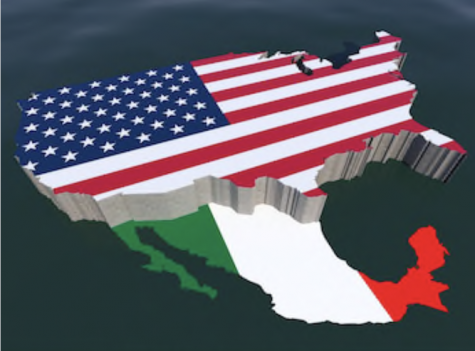OPINION: Border immigration isn’t a crisis
From Issue 7
 On February 15, 2019, President Trump declared a national emergency to address what he called the immigration crisis at the U.S. border with Mexico. He did so in order to appropriate funds to construct a border wall with Mexico, as Congress only approved $1.4 billion for border security in the budget that was passed prior to the president’s national emergency declaration.
On February 15, 2019, President Trump declared a national emergency to address what he called the immigration crisis at the U.S. border with Mexico. He did so in order to appropriate funds to construct a border wall with Mexico, as Congress only approved $1.4 billion for border security in the budget that was passed prior to the president’s national emergency declaration.
The president’s declaration has gotten praise from some, and condemnation from others. Many people, myself included, do not agree with the president that the immigration situation at the border is a crisis. After all, if the situation is a crisis, why could Congressional Republicans not pass legislation to build a wall and fix the country’s immigration problems when they had a majority in December? If the situation really is a crisis, I would have expected there to be less disagreement among Republicans over how to handle this so called “crisis.” In reality, the debates over border security and Trump’s wall are merely political theatre. The most significant issue that has been raised by this debate is not immigration, but rather the precedent that President Trump is setting by declaring a national emergency because Congress didn’t do what he wanted it to do.
Since the National Emergencies Act was invoked in 1976, presidents have had the power to declare national emergencies so that the government can respond quickly to a crisis when the need arises. 60 such emergencies have been declared by presidents since then, including President George W. Bush’s declaration of a national emergency after 9/11 and President Trump’s current declaration. President Obama declared 13 national emergencies during his time in office, with emergencies ranging from Yemen to the Swine Flu outbreak in 2009. Some national emergency declarations have been questionable, such as President Trump’s declaration of a national health emergency over the opioid crisis. The President’s national emergency over border security, however, is different.
President Trump’s national emergency declaration undermines our legislative process. Congress did not give him what he wanted, so he simply went around them. Instead of respecting what Congress decided, he has decided to use emergency powers to acquire funding for his wall. The National Emergencies Act allows President’s to bypass Congress to respond to crises, but not to undermine what Congress has decided. Congress can pass a resolution to overturn emergency declarations, but the Supreme Court has ruled that a President can veto a Congressional resolution. Overturning a presidential veto requires two thirds support in both chambers of Congress, which is very unlikely to happen, so the battle over Trump’s emergency declaration will have to take place in court.
To supporters of this decision, I ask how you would react if a future President was to use the precedent set by President Trump as legal grounds to declare a national emergency over an issue such as gun control, and order that money be set aside to increase regulations on firearm sales and ownership. In all likelihood, the same people who supported using emergency powers when President Trump did it would now find themselves opposed to doing so. The President of the United States should not be allowed to use emergency powers just because he didn’t get his way, and I am confident that when challenged in court this declaration will be struck down.






